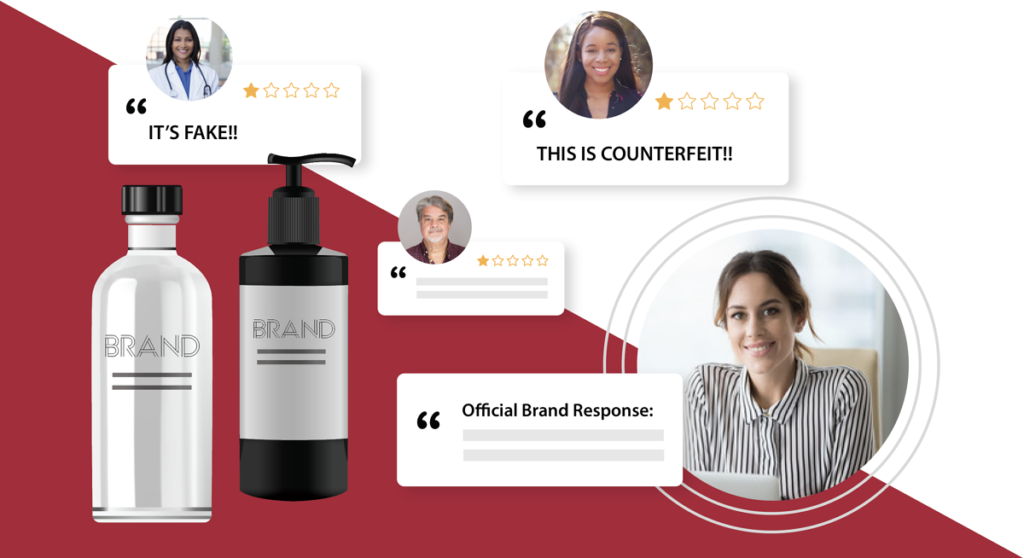Concerns Over Counterfeiting on Amazon? 3 Ways to Protect your Brand

Recently, Amazon has ramped up their efforts to combat counterfeits. According to an Amazon blog post, in 2018 alone the company “invested over $400 million in personnel and tools built on machine learning and data science” in order to protect customers from counterfeits.
What’s more, a bipartisan bill called the Shop Safe Act of 2020 was introduced earlier this month that, if passed, would require eCommerce platforms like Amazon to take a series of steps to prevent the sale of counterfeit products. Those that don’t would be held liable for the sale of the sale of the counterfeits.
The Shop Safe Act of 2020 — along with Amazon’s own anti-counterfeiting initiatives are important steps to reduce risk for consumers and brands, regardless of eCommerce platform. However, it’s also key for brands to be proactive about protecting their shoppers — and their hard-earned reputations.
Read on to explore four ways you can protect your brand from the harmful effects of counterfeiting.
→ Access Now: Negative Feedback Creates Positive Change [Free Guide]
Trademark Your Assets
When brands are busy developing and selling innovative new products, filing trademark applications may not seem like a priority. But it should be. When you have a trademark in place, you have more rights under the law to protect your brand. What’s more, a trademark allows you to access other Amazon services — such as Brand Registry (more on that later) that can help you combat counterfeits and protect your brand.
Filing for a trademark can seem daunting and expensive, though, especially for smaller brands with limited resources. However, last year, Amazon launched a service called IP Accelerator to make the process quicker and easier. Essentially, the service connects brands with vetted IP law firms that can help with the trademark registration process and other IP-related needs. These firms are pros at everything related to trademarks and intellectual property, and because rates are pre-negotiated, brands go in knowing exactly what they’ll pay. If you use IP Accelerator, you’ll also get access to various brand protections from Amazon, even before you officially receive trademark registration.
Sign Up for Brand Registry
Once you have a trademark in place (or, once you’ve filed for a trademark using Amazon’s IP Accelerator), you can sign up for Brand Registry. If you’re not familiar with it, Brand Registry is a free service that helps protect your brand from the damaging effects of counterfeits.
When you sign up for Brand Registry, you’ll be asked to provide information about your brand and its intellectual property — such as logos and product photos. Then, Amazon will leverage that information as it automatically scans for suspicious activity, such as a seller using your logo or product photos. When this type of activity is detected, you’ll receive an alert. With Brand Registry, you can also find and report violations on your own.
Brand Registry members are also eligible for Amazon Project Zero, which is yet another service created to eliminate counterfeits on Amazon. With Amazon Project Zero, brands can remove counterfeit listings themselves, rather than contacting Amazon for assistance. You can find out if you’re eligible for Amazon Project Zero by logging into your Brand Registry account.
Manage Your Product Reviews
Ratings and reviews help shoppers make purchase decisions. But they can also be a key way to identify and address issues — including counterfeits.
It’s essential to monitor your product reviews — especially the negative ones. If you use a review management platform like Reputation Studio, you can set up a list of keywords, such as “counterfeit” and “fake.” That way, if a shopper submits a review with one of those keywords, it will automatically be escalated to the appropriate person or team to investigate and handle accordingly.
While your teams are investigating these reviews, be sure to respond publicly to the person writing the review. Of course, your teams can privately request additional information that will help them track down the source of the counterfeit. But publicly responding to the customer will show them (and future shoppers) that you truly care about your customers and stand behind your products.
→ Access Now: Negative Feedback Creates Positive Change [Free Guide]
Protect Your Brand with Reputation Studio
Counterfeits are a growing concern for brands, especially with the increased demand for essential products due to the COVID-19 pandemic. While Amazon has measures in place to thwart counterfeiters, it’s essential for brands to be proactive about protecting their customers — and their reputations.
Want to learn how Reputation Studio can help you protect your brand by effectively managing product reviews across channels? Contact us to find out how we can help.